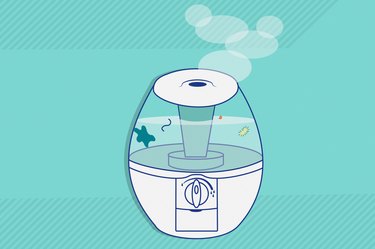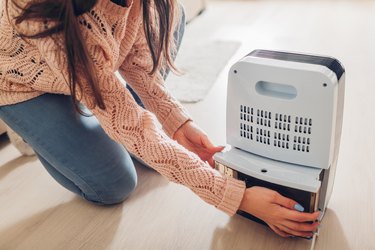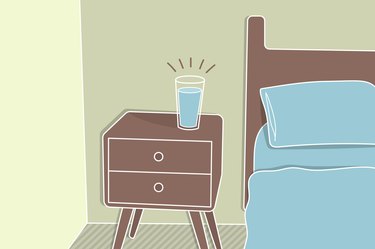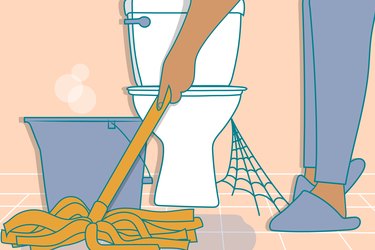
When the air is dry indoors, many of us rely on humidifiers to relieve run-of the-mill respiratory symptoms. These go-to gadgets — which increase moisture levels — can do wonders for woes like dry sinuses and frequent nosebleeds (not to mention soothing parched skin and chapped lips).
But you can only reap these big benefits if you're cleaning your humidifier correctly and consistently. Because when you let your device grow dirty, all kinds of no-good germs can nestle in the nooks and crannies of your unclean machine. And this can set you up to get sick.
Video of the Day
Video of the Day
Here, Jonathan D. Sexton, PhD, research scientist at the Environment, Exposure Science and Risk Assessment Center at the University of Arizona, explains how a humidifier can turn into a health hazard and shares the proper way to maintain your machine to minimize your risk of becoming ill.
What Germs Can Lurk in a Dirty Humidifier?
When it comes to which pesky pathogens can propagate in your humidifier, "really the sky is the limit," Sexton says.
From mold to bacteria, there's a medley of microorganisms that may make their home in your humidifier, according to the Children's Hospital Colorado.
A type of bacteria called "legionella is the big one," Sexton says. These potentially harmful microbes typically cause multiple outbreaks of Legionnaires' disease (more on this later) per year, he says.
And where you use your humidifier may also affect the kinds of bad bugs it breeds. "If they are placed in the kitchen, there might be more foodborne bacteria growing in the unit versus near a bathroom where there might be more fecal organisms," Sexton says.
Can These Germs Make You Ill?
It's possible that an unsanitary machine can make you sick. Here are a few ways a dirty humidifier can mess with your respiratory health:
1. It Can Lead to a Lung Infection
Ultrasonic (or "cool mist") humidifiers create a cool mist with high-frequency vibration. And in the process, they can aerosolize things like mold and bacteria that you breathe directly into your lungs, according to the Children's Hospital Colorado.
But when you inhale contaminated mist containing bad bacteria like Legionella, you can develop serious lung infections like Legionnaires' disease, according to the Centers for Disease Control and Prevention (CDC). People with Legionnaire's disease may experience a cough, shortness of breath, fever, muscle aches and headaches that may require antibiotics (or even more intensive hospital care).
Similarly, pseudomonas — another type of dangerous bacteria — can breed in your humidifier and infect you through small droplets of water, Sexton says. The most common kind, called pseudomonas aeruginosa, can lead to lung infections like pneumonia, per the CDC.
Certain groups of people have a higher risk of becoming ill with a lung infection. For example, older folks, individuals with weakened immune systems and those with chronic lung disease and other underlying conditions are more susceptible to getting sick with Legionnaire's disease, according to the CDC.
Even still, the tainted mist produced by dirty humidifiers can also cause lung infections and flu-like symptoms in healthy people as well, per to the Mayo Clinic.
But bacteria aren't the only bad things you're breathing. Humidifiers also release things like minerals into the air. That's because tap water — and even bottled varieties — contain minerals. And when these minerals become suspended in the air, they can produce lung problems too, per the Children's Hospital Colorado.
Noticed a white film of dust on your furniture and other surfaces since you've started using your humidifier? That's a surefire sign that minerals are present in your water and air.
2. It Can Aggravate Chronic Breathing Problems
As we know, contaminated mist from unclean humidifiers is more likely to cause infections in people with underlying lung conditions. So, it should come as no surprise that they can also bring on other breathing problems for those dealing with chronic conditions such as asthma.
Not only can microbes like mold and bacteria worsen your breathing symptoms when suspended in the air, but dust mites — which thrive when humidity is high — can also impair your ability to inhale easily.
Thing is, when you run a humidifier regularly, you create an ideal, moist environment for these meddling mites to multiply, according to the American Academy of Allergy, Asthma and Immunology (AAAAI).
And for people with asthma, dust mites typically tend to trigger worsening symptoms, including persistent sneezing, cough, congestion, facial pressure and even severe asthma attacks, per the American Lung Association (ALA).
3. It Can Exacerbate Allergies
If you have allergies, a dirty humidifier can definitely do more damage than good. Here's why: the increased humidity from your unit fosters the growth of common allergens like mold spores and dust mites, which can activate an allergic reaction.
"When it comes to breathing in biologicals, your immune system takes over," Sexton says. As your system fights off "invaders," your body's defenses kick into high gear. And this ramped up response may result in a worsening of your existing allergy symptoms.
Not to mention, the minerals in tap water can also promote more bacteria buildup. When released into the air, these maddening microorganisms can further irritate your sinuses, according to the AAAAI.
Tip
If you notice your humidifier is making your space soggy (think: windows, carpeting or drapes feel damp to the touch), you should dial down the humidity setting, according to the Mayo Clinic.
The best way to minimize excessive moisture and decrease dust mites and mold is to monitor the amount of humidity in your home. Maintaining a humidity level between 40 to 50 percent is the sweet spot, per the AAAAI.
How Often Should You Clean Your Humidifier?
Probably more often than you think. As far as frequency, the Mayo Clinic recommends cleaning your humidifier every three days to get rid of any gunk (like mineral deposits or slimy biofilms) that may accumulate in the tank or other parts.
If that sounds like too much work, scrubbing down your humidifier once a week is also a good standard, according to the Children's Hospital Colorado.
How to Clean Your Humidifier

"There is no one-step guideline to have a clean humidifier," Sexton says. "Each unit is different and will require a different maintenance routine."
The smartest strategy for a sanitary machine is to always refer to the manufacturer's instructions, he adds.
While cleaning directions will vary by manufacturer, the Children's Hospital Colorado offers these general recommendations for keeping most humidifiers clean without damaging the device:
- First, unplug the unit.
- Fill the tank with enough distilled white vinegar to cover any parts in contact with the water.
- Let it sit for 20 minutes.
- Use a toothbrush to scrub the cracks and corners.
- Rinse the tank well and let it air dry.
Also try these additional tips to keep your humidifier tidy, per the Mayo Clinic:
- Use distilled or demineralized water. These kinds of water contain fewer minerals than tap water.
- Change humidifier water often. Empty the tanks, dry the inside surfaces and refill with clean water every day, if possible, especially if using cool-mist or ultrasonic humidifiers.
- Change humidifier filters regularly. If the humidifier has a filter, change it at least as often as the manufacturer recommends and more often if it's dirty.
- Prepare humidifiers for storage. Drain and clean humidifiers before storing them.
In addition, avoid using harsh chemicals to clean your humidifier since these substances can become airborne and be breathed into the lungs, according to the Children's Hospital Colorado.
And if your machine's manufacturer's instructions direct you to use bleach or other disinfectants, always rinse the tank thoroughly after cleaning to avoid the aerosolization – and inhalation – of these potentially harmful chemicals, per the Mayo Clinic.
Tip
If you notice stubborn deposits or biofilms building up on your machine that are difficult to remove, it’s probably time to purchase a new humidifier, Sexton says.
Are Humidifiers Worth the Risk?
While a filthy humidifier is not your friend, no one should be scared or deterred to use these devices.
"They are so handy and help out in so many aspects of life," Sexton says. "The main point to remember is maintenance," he says.
Think of it like this: If you never change your car's oil, it's going to break down and cause problems for you. Similarly, "if you don't do proper upkeep on these units, someone might get sick," Sexton says.
But when you can't commit to cleaning your humidifier regularly, the potential costs to your health outweigh the benefits.
In this case, it's best to consider your options. For example, when buying a machine, be strategic about your selection. Certain kinds of humidifiers — like cool mist models — are more prone to projecting pathogens into the environment. Whereas other types, such as evaporators and steam vaporizers, may be less likely to emit allergens into the air, according to the Mayo Clinic. (Here are some of the best humidifiers.)
Still, you need to clean these units consistently and replace dirty filters regularly.
Alternatively, you can ditch your device entirely and stick to safer methods. For instance, saline drops and sprays are equally effective at doing the job of humidifiers — they increase moisture and decrease dryness in your nose and throat without all the health drawbacks, per the Children's Hospital Colorado.
So, How Bad Is It Really to Never Clean Your Humidifier?
Simply put: An unhygienic humidifier can hamper your respiratory health, especially if you have existing allergies, an underlying breathing condition or a weakened immune system. But even if you're in good health, a filthy device can potentially lead to a lung infection.
At the end of the day, there's only one way to reduce these risks and reap the moisturizing benefits of your humidifier: Keep it clean.
And if you know that you'll be unable to maintain an immaculate machine, it's probably best to store it until you can make the time commitment.
- Children’s Hospital Colorado: “The Hidden Danger of Humidifiers”
- Centers for Disease Control and Prevention: “Pseudomonas aeruginosa in Healthcare Settings”
- American Academy of Allergy, Asthma and Immunology: “Humidifiers and indoor allergies”
- American Lung Association: “Dust Mites”
- Mayo Clinic: “Humidifiers: Ease skin, breathing symptoms”
Is this an emergency? If you are experiencing serious medical symptoms, please see the National Library of Medicine’s list of signs you need emergency medical attention or call 911.



